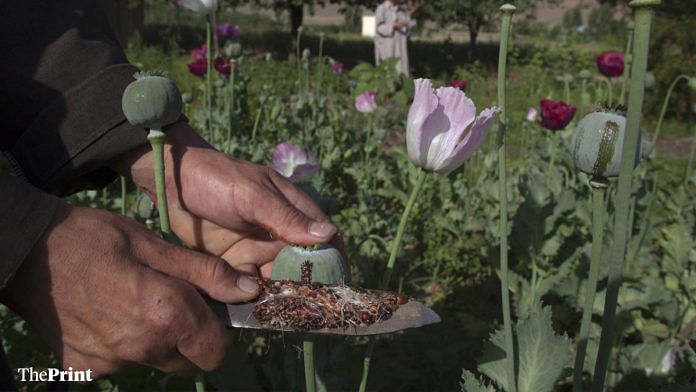At the annual Chappar Mela last week in Punjab, farmers sowed opium seeds. The symbolic move triggered a fresh debate about controlled cultivation and supply of opium in the state.
The Print asks: Will making prescription opium available help solve Punjab’s drug menace or aggravate it?
Instead of helping youth, we are giving them sedation on a platter
 Sunil Jakhar
Sunil Jakhar
Punjab Congress President
I am pained to see that even a demand like this is being raised in Punjab. I can understand a drug addict rooting for opium distribution centres to be opened in the state but here wise, experienced men are also offering such a regressive recourse to tackle the drug problem in the state. For Punjab, legalising opium would be like jumping from the frying pan into the fire.
It only shows that politicians have nothing positive to offer to the youth. Instead of moving towards a future where the youth are encouraged to lead healthy productive lives, we are offering them sedation on a platter!
It is a competitive world out there and whatever demographic advantage that India boasts of in terms of having the youngest population is negated if the solution we can offer as a nation is to allow them to remain in an unproductive unhealthy body and mind. We are competing with China to become a world power. At one point in their history, it was country of addicts but look at the way they have fought it.
Yes, it is a tough battle to wipe out addiction from the state. We have inherited a huge problem but the solution does not lie in succumbing to it but fighting it. I agree with the Punjab chief minister Captain Amarinder Singh that a national drug policy is the need of the hour.
Challenge for Punjab will be to get the right level of controls in place

 Anand Grover
Anand Grover
Sr. Advocate and Director, Lawyers Collective
Tripti Tandon
Deputy Director, Lawyers Collective
In our opinion, supplying opium on prescription will help in tackling the drug problem in Punjab. Historically, in India, opium was a legitimate commodity whose production, trade, sale and use were regulated and taxed. The introduction of the NDPS Act in 1985 changed that, although the use of narcotic drugs and psychotropic substances medical and scientific purposes is still permitted. Exercising powers conferred under section 10(1)(a)(ii) of the NDPS Act, some states have elaborate rules for allowing people access to opium on prescription. Punjab would not be an outlier if the administration chooses to employ this approach.
The advantages of regulating opium supply are obvious. Persons who use and/or are dependent on opium will have access to a legal, possibly government-controlled, source as opposed to buying it in the illegal market, which is inherently dangerous. The quality and quantity of the drug can be monitored so that harmful consequences of adulteration and overdose are avoided. Most importantly, people who use opium will be under the care of doctors and be able to manage their use in a medically supervised environment. This is a far better outcome than sending opium-dependent persons to jail under the existing NDPS Act.
The challenge for the state will be in getting the right level of controls in place. If access to prescription opium is highly restricted, it is likely that people will switch back to the illicit dealers. At the same time, if the controls are lax and access is unrestricted, adverse consequences may follow.
Having seen the devastating consequences of criminalising opium users – both young and old— it is about time we examined alternate approaches. Experimenting with a regulated supply of opium, which is already provided for under the law, would be a good place to start.
If govt encourages sale of alcohol to earn revenue, it should look at regulating sale of opium too
 Laxmi Kanta Chawla
Laxmi Kanta Chawla
BJP leader & former Punjab health minister
If governments have no problem in allowing people to drink alcohol, why should they not legalise the use of opium and its husk, which is a lesser evil. A person who consumes alcohol is far more dangerous to himself and society than someone who consumes opium. If the government really wants to ban all forms of addiction, they should first ban alcohol. Addiction to anything is bad for health.
There is a need to understand, using scientific methods, what exactly is the impact of opium consumption on the user before putting forth any argument about its legalisation. I am not a scientist but I do recall that when we were kids, mothers would give a small dose of post (opium husk) to children when they were ill. Poppy seeds or khus khus is used in preparing cooling drinks for summers even now. Bhaang grows everywhere in Punjab. It is drunk during festivals.
Again, not based on any empirical studies but only from my own observation, I believe that alcohol is probably a far bigger detriment to health than opium. Alcohol has ruined families just as the chemical derivatives of opium have. Heroin is deadly and so are its adulterated forms. But if the government actively encourages the sale of alcohol in the state to earn revenue, it should look at regulating the sale of opium too.
Health impact of consuming opium is lesser when compared to heroin or its adulterated forms
 Dr Aditya
Dr Aditya
Amicus curiae in drug cases, Punjab and Haryana High Court
I would respond to this debate as a medical professional. I believe that making opium available to addicts through government licensed vends will be able to contain the present explosion of drug addiction in Punjab, Haryana and Himachal Pradesh.
Not so long ago, district level government health officers declared opium addicts as dependent on small amounts of the drug. The doctor would certify that their body has become accustomed to opium. Such individuals would then get a small dose of the drug each day from such vends. The economic cost and social cost of this system were limited. But it was discontinued.
The fact remains that despite all the efforts being made, illegal cultivation of opium or its leakage from legal farms is continuing.
Taking a practical view will lead to several significant changes. It will reduce the illegal supply of drugs hitting the commercial benefit to suppliers. The health impact of consuming opium is lesser when compared to heroin or its adulterated forms. It can substantially reduce the possibility of HIV and hepatitis cases among addicts as well as deaths due to a drug overdose. It can facilitate the generation of data as to the extent of the problem and help government intervention in treating the addicts.
But having said all this, a vital disclaimer faces the system, if it ever starts. The system of legalising the use of opium for a set of registered opium addicts has to be strictly controlled and monitored by the government and the courts.
The Punjab police registered almost 14,000 cases last year under the NDPS Act. The move will also free the police to focus on larger drug hauls and bigger cartels.
Drug mafia is a larger problem than drug addicts
 Dr Dharamvira Gandhi
Dr Dharamvira Gandhi
Former Aam Aadmi Party MP, Patiala
Government-controlled cultivation and supply of opium to addicts is the need of the hour in Punjab. No society in the world is drug-free. People have used drugs for various purposes in every phase of human history. Till 1955 opium was cultivated in Punjab like many other states in India. The cultivation was controlled by the government and opium farms were clearly demarcated. Consumption of opium was neither a health nor a law and order problem. Every village had 5-6 amalis (opium addicts). You will find their mention as village entertainers in stories of the time. Opium users did not find its use detrimental to their health. Many lived up to 90 years and more. During the Green Revolution in Punjab, opium was widely used by farmers who worked for hours at a stretch in their fields.
When the NDPS Act was passed in 1985 use of all drugs was banned. That gave birth to a mafia which supplied drugs illegally. And since large sums of money were involved, it suited them to generate an increased demand for drugs. From 5-6 drug users in a village, the number is now in hundreds. The mafia shifted from the sale of opium and its husk to medical, synthetic and chemical drugs which spell death for the user. The emergence of the drug mafia was a phenomenon not just in Punjab or India but in many countries of the world. This forced the UN to declare in 2011 that the war against drugs had failed. Having learnt a lesson, over 30 countries have now legalised marijuana.
An addict is a patient, not a criminal. The mafia is the promoter and the criminal. Thousands of youth are rotting in jail because they have been arrested for using drugs. They need to be dealt with sympathetically and treated. The problem is not of morality or law and order, it is of the government’s will to take a humanitarian approach.
Opium cultivation will turn us into Afghanistan or Pakistan in a few years
 Dr P.D. Garg
Dr P.D. Garg
Head of department of psychiatry, Government Medical College, Amritsar
I am against the legalisation of opium. Any such move will be disastrous and suicidal for Punjab. If cultivation of opium is allowed in the state, it will lead to its illegal cultivation as well. The produce will be diverted for sale and misuse from controlled farms, as it is already happening in states where opium is being cultivated. Second, the conversion of opium into heroin is a simple chemical process and people will set up laboratories at home to produce it. Heroin will be available like bread. In a few years from now, we will be like Afghanistan and Pakistan with their killing fields.
However, if the logic of supplying opium to addicts is to shift them to a “safer” drug, then the process has been already started through the alternative drug therapy programme being run by the government. More than 50,000 drug addicts are being treated at the outpatient opioid assisted treatment (OOAT) centres across Punjab. In these centres, addicts are given an alternative but a safer drug which can be used till the addict is ready to leave the habit. The alternative drug is harmless and can be taken for life but the effort is to wean the addict from it.
The focus of the state would shift to regulating opium cultivation and supply. The government should instead focus on reducing the demand for drugs and treat the users. The former can be done through education and generating awareness and the latter through providing better treatment facilities to drug addicts.
By Chitleen K Sethi, Associate Editor at ThePrint.




What a detailed and justifiable explanation given by Dr. P.D. Garg…..
great one sir